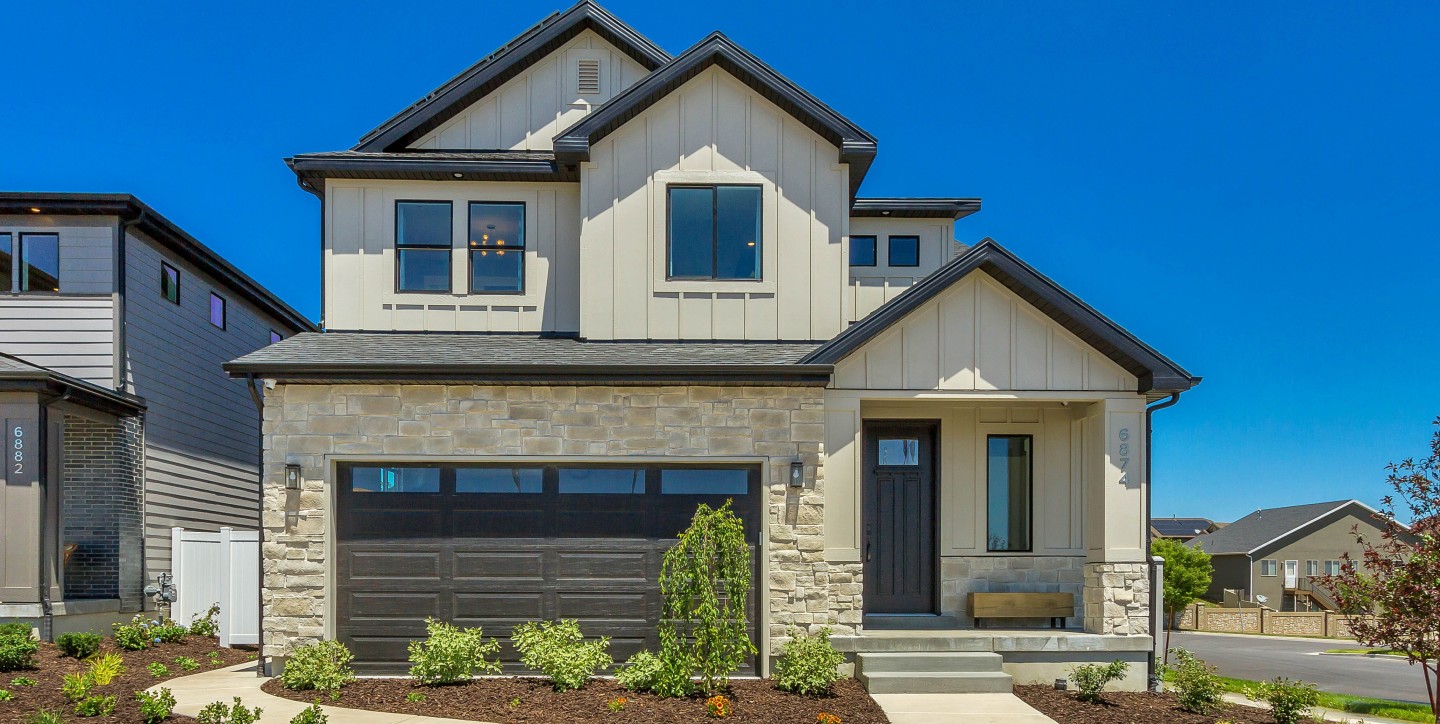Deciding between a new home or an older, pre-owned home isn't the easiest choice. Both have the capacity to fulfill your dreams and meet your needs – but which is truly right for you in the long term? Here are some pros and cons to help guide you.
The Pros & Cons
 Buying a home isn’t just a significant financial investment. It’s an emotional investment as well. Your home is where you’ll grow, make memories, and spend years of your life.
Buying a home isn’t just a significant financial investment. It’s an emotional investment as well. Your home is where you’ll grow, make memories, and spend years of your life.
Unfortunately, choosing between a newly constructed home or a pre-owned, older home can be overwhelming—particularly if you don’t know your options.
In this guide, we'll break down the pros and cons of both buying an older home and choosing a newly built home, so you can make the best decision for your family's needs and budget.
Buying an Older Home
For most homebuyers, an existing home is the most popular option. Considering how many pre-owned homes are available, it’s easy to see why first-time homebuyers feel this way.
But before you buy an existing home, understand that they can come with their fair share of problems, some of which can cost you a lot of money and headaches.
The Pros
- Upfront Cost
The most common reason people choose an existing home is the price. Often, an older home will have wear and tear, outdated finishings, and awkward layouts that decrease its value over time. This can lead to cheaper down payments and upfront costs.
Even if an older home doesn’t have many issues, it will likely cost you less initially than a newer build with the same square footage.
- Availability
A vast majority of homes on the market are pre-owned, so it’s easier to find an existing home when you’re in a time crunch. Unlike some homes still in construction, pre-owned homes are often quicker to purchase and move into.
The exception to this would be if an existing home has problems, like a damaged roof or rotting siding, that need to be addressed as part of the pricing negotiations.
- Character
Some older homes carry a one-of-a-kind charm that you can’t find anywhere else, as well as a history from the previous families who built memories there. If you’re a fan of the lived-in style, you may find an older home better fits your aesthetic.
- Location
Many older homes are located near the heart of the city, closer to shopping centers, restaurants, and businesses. This can cut down on your commute and make day-to-day life more convenient.
The Cons
- Compromises
Finding an existing home that perfectly fits your family’s needs is rare. So whether kids are stuck sharing a small bathroom, or you’re piling clothes on a chair because your laundry space is too small, you’ll have to work around your home’s quirks.
- Increased long-term costs
Maintaining an older home can be costly. From structural damage to faulty wiring to termite infestations and everything in between, an existing home can come with a number of unpleasant surprises.
It’s a good idea to take a careful look at each system (heating, wiring, plumbing, air conditioning, windows, chimneys) to ensure they are modern, efficient, and safe. One or more of these may need to be upgraded. These costs can quickly add up.
- Potential health risks
Your home is your safe space, so it should actually be safe for you to live in. Unfortunately, some older homes have hidden issues that could pose a hazard to your family’s health, such as black mold, asbestos, unclean water, chemical-filled paint, or flammable installation.
Always be sure to have your home thoroughly inspected before you move in. And if you notice your family seems to be experiencing problems like headaches or respiratory issues, be sure to have your home evaluated for issues like mold or toxic building materials.
- Renovations & updates
Few people buy a dated home without intending to update it one way or another. The cost of making a home fit your family’s needs can quickly outweigh a low down payment. The average homeowner allocates $111K toward home remodeling.
In addition to the financial burden of updating a pre-owned home, you’ll also have to deal with the hassle of either living in a construction zone or hiring a contractor to do the work for you. This added stress can put pressure on your family, especially if the rooms that need the most attention are where you spend most of your time.
Buying a New Home
Many prospective buyers don’t even consider new builds with their home search because they’re afraid they won’t be able to afford them. But newer construction homes have become more affordable than ever, and there are some hidden savings and other benefits you might not consider.
The Pros
- Move-In Ready
Old homes are…well, older. So it’s no surprise that many come with outdated features, clunky layouts, and bathrooms in need of an upgrade. Newly built homes, on the other hand, are designed to fit modern styles and needs.
If you want a home you can show off right away, or a home that feels like it’s put together and designed with real life in mind, you’ll be better off choosing a newly built home instead. All you have to do is move in, and you’re ready to sit back and relax in a place that feels just right.
- Peace of Mind
Perhaps the biggest benefit of a new construction is the peace of mind it can provide in terms of safety, quality, and value. Modern homes are held to a different standard, meet strict construction requirements, and often include highly efficient materials and appliances to help you get the most from your investment.
You also don’t have to worry about mold or unseen damage like you might in an older home. Your home will be safe and secure from day one.
- Community
Some new builds are located in vibrant neighborhoods where you have access to amenities like parks, transportation, public pools, shopping, and restaurants. You might not be in the heart of town, but you’ll be close to family-friendly places and neighbors in a similar life stage as your family.
- Long-term savings
Depending on the homebuilder you choose, your new construction won’t require the expensive upkeep and maintenance that an older home will. Heating, plumbing, electrical, and the like should be set up right the first time, with efficient utilities that will save you even more in the long run.
And because the home better suits your family’s needs from the beginning, you won’t have to spend tens of thousands to update bathrooms or make the kitchen presentable. You can jump right into adding your own personal touches to your new home.
The Cons
- Upfront cost
Because the home is a newer construction and doesn’t come with issues like older properties, you can expect to spend more upfront on the investment. The cost can vary depending on the home builder, location, community, size, and features.
Many people believe new homes are out of their budget. However, new builds are more affordable today than they were in the past. Compared to the cost of repairs and upgrades pre-owned homes often require, this cost is often lower down the road.
- Style
Many new construction homes are designed with a modern aesthetic. To some, this is a plus, but others may prefer a historical look.
If you find a home that fits your lifestyle perfectly but doesn’t match your style, you can always make changes to make it feel like you. Simple tweaks like replacing light features or changing paint colors can go a long way.
- Availability
Because new homes are built with efficient materials and attention to detail, they can take a while to hit the market. As a result, there may be fewer new homes available at once. This could mean you have less variety to choose from when compared to existing properties.
If you find a builder you trust and want to work with, it’s best to follow them regularly to catch homes as soon as they become available. Otherwise, you could miss the ideal home in the perfect neighborhood.
- Consistency
Not all homebuilders are the same. Some focus on speed and cutting costs, while others prioritize health and quality. As a result, you can’t trust that every new construction is going to be flawless and built the right way. You’ll need to find a builder you can trust who focuses on enhancing your life through your home, not just making a sale.
Always read customer reviews from homebuilders before you sign anything. Check for problems that might have shown up further down the road, if (and how) the builder resolved the issue, and how well the property stood the test of time.

Find Your Happy Place with Woodside Homes
If you choose to buy a new home, we would love to hear about your ideal space and share our best-fit homes with you. We know how overwhelming it is to find the right home for your family. That’s why it’s our purpose to help you navigate the process, make decisions with confidence, and find a home you can be proud of.
With over 40 years of experience, we have helped more than 50,000 families find the right home and neighborhood for their needs. Our new construction homes are built with high-quality materials, energy-efficient amenities, and Healthy Homes features that put your family’s well-being first.
Don’t settle for a home that doesn’t fit your lifestyle. Reach out to our team today, and let’s work together to find a home that fits where you are in life and evolves with you.

.png)





